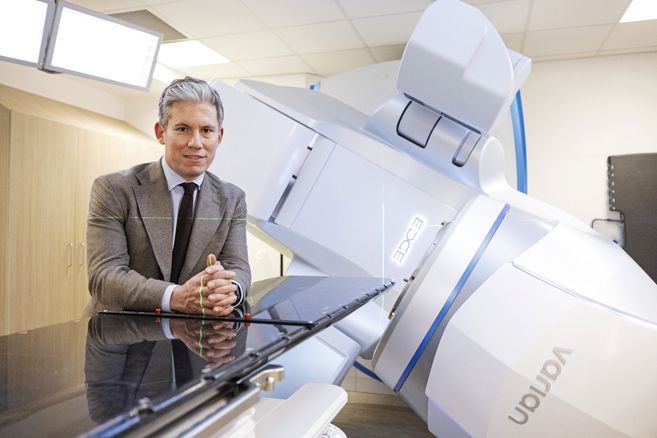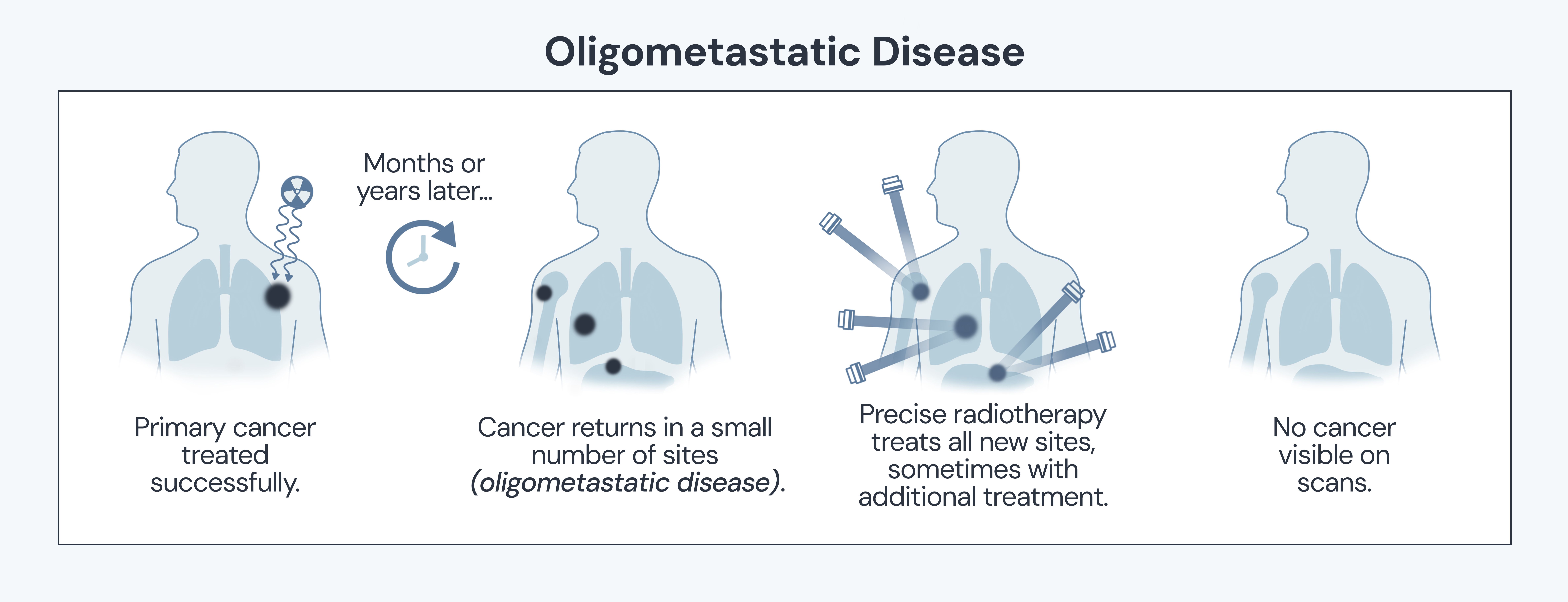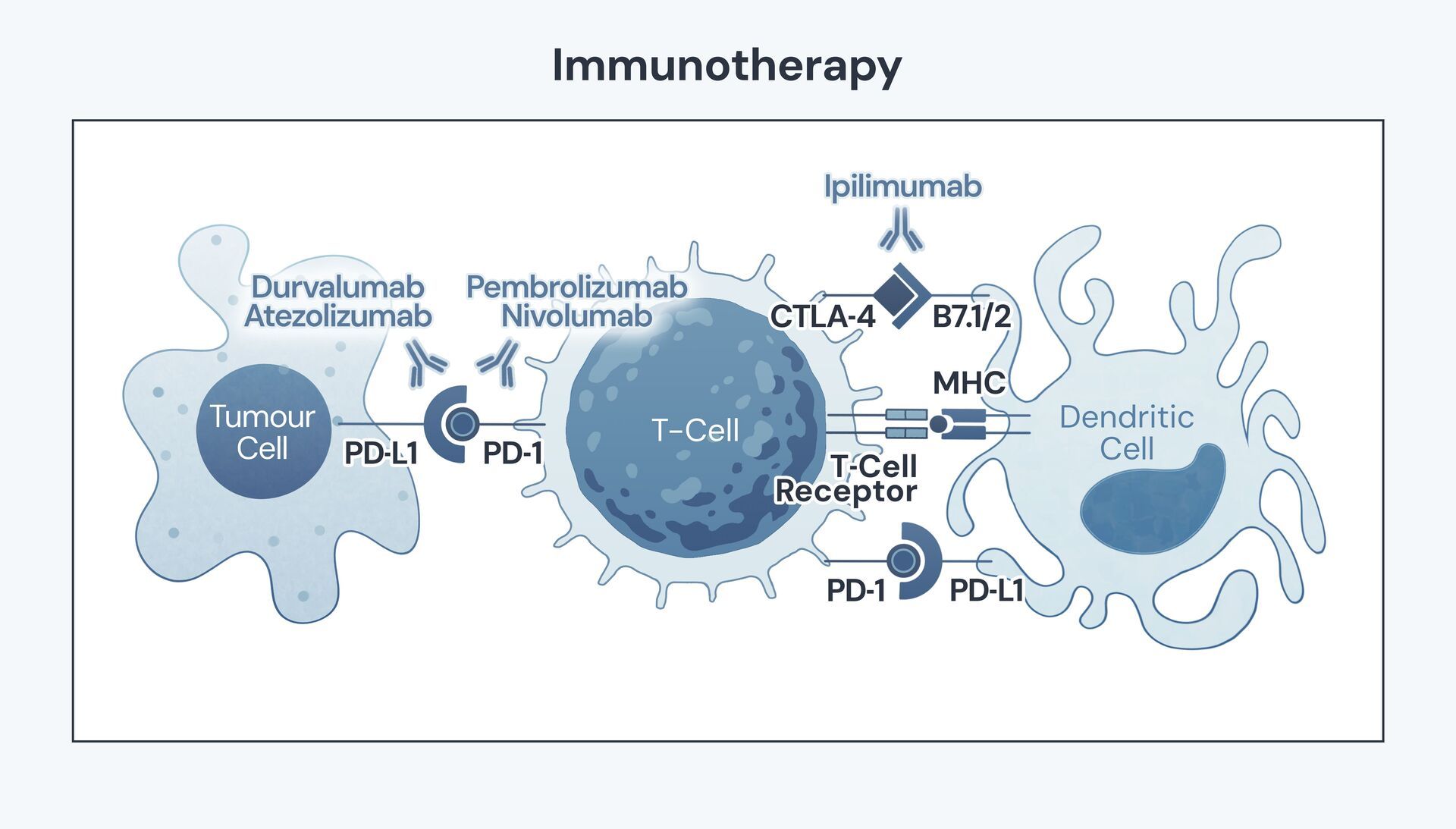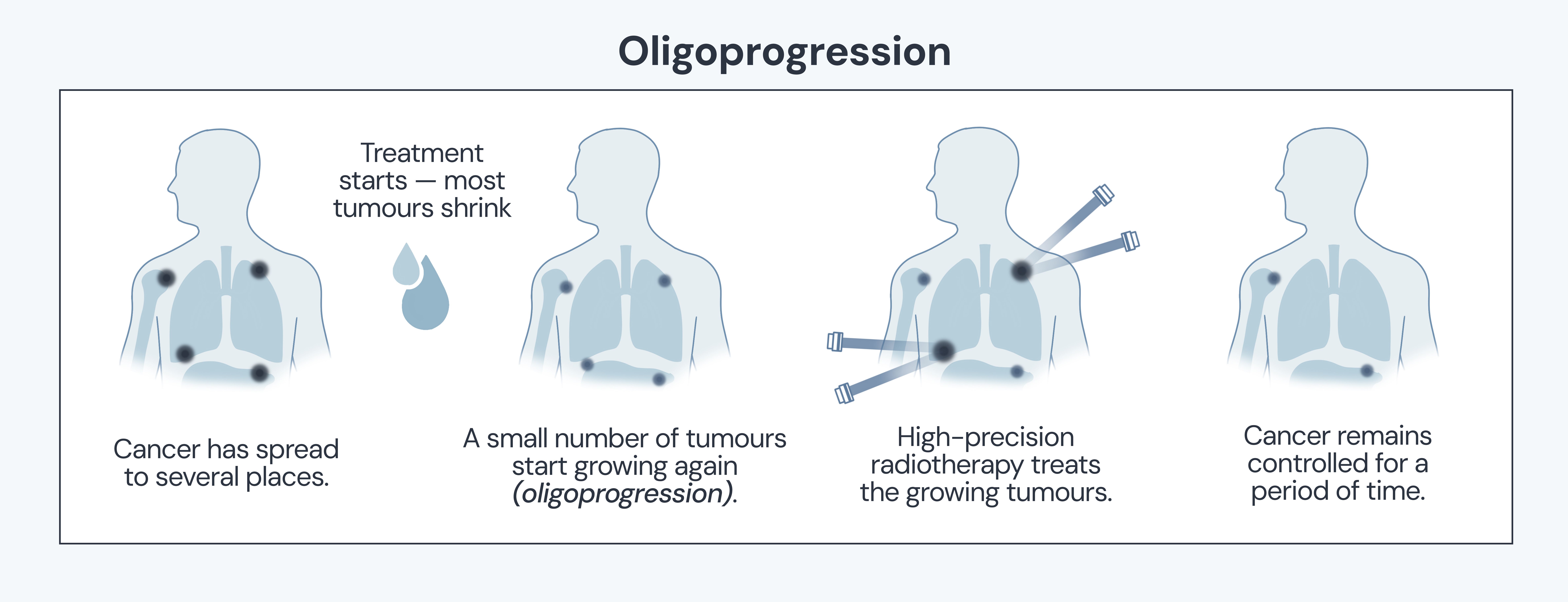Stage 4 Cancer: Understanding Your Diagnosis and Treatment Options
A diagnosis of stage 4 cancer turns your world upside down. You're probably searching for answers late at night, reading conflicting advice, and wondering what your options really are. I've spent over 20 years treating advanced cancers, and I know that clarity matters as much as the treatment itself. Today's therapies, including immunotherapy and advanced radiotherapy techniques like SABR, offer more hope than ever before. But time matters, and so does having the right specialist in your corner. This guide explains what stage 4 cancer means, what treatments are available, and how to take the next step with confidence. It, hopefully, answers some of the questions that you you may have. If you'd like to discuss your individual situation, you're welcome to request a consultation.


Jump to:
- Need immediate guidance?
- What Is Stage 4 Cancer?
- Understanding Metastatic Cancer Across Different Types
- Is Stage 4 Cancer Terminal?
- Can You Survive Stage 4 Cancer?
- Stage 4 Cancer Life Expectancy With Treatment
- Systemic Therapies
- Local Treatments for Stage 4 Cancer
- You Don’t Have to Navigate This Alone
- How Long From Stage 1 to Stage 4 Cancer?
- Stage 4 Cancer Treatment Options
- Systemic Therapies
- Local Treatments for Stage 4 Cancer
- Can Immunotherapy Cure Stage 4 Cancer?
- Ready to Explore Your Treatment Options?
- Monitoring Your Treatment Response and Planning Your Next Steps
- Get Molecular-Level Clarity About Your Stage 4 Cancer Diagnosis and Response to Treatment
- Oligometastatic Disease: When Strategic Treatment Makes Sense
- Learn more about stereotactic radiotherapy for oligometastatic disease here.
- Setting Priorities for Stage 4 Cancer Care
- When Should You Talk About End-of-Life Care?
- Finding the Right Specialist for Stage 4 Cancer
- Stage 4 Cancer: A Team Approach
- Beyond Statistics: Living with Stage 4 Cancer
- Monitoring Your Progress
- Taking the Next Step
- Would you like to discuss your Stage 4 cancer treatment options?
Need immediate guidance?
If you or a loved one has just been diagnosed with stage 4 cancer and need expert advice urgently, don't wait:
-
✓ Consultation available within 48 hours
-
✓ No GP referral needed
-
✓ Video or in-person appointments
-
✓ Clear explanation of all your options
Book in directly here or call 020 7993 6716
Book urgent consultationWhat Is Stage 4 Cancer?
What is stage 4 cancer? It means the cancer has spread from its original site to distant parts of the body. This spread, known as metastasis, defines cancer as being "stage 4" or "metastatic." Cancer cells break away from the primary tumour. They travel through the bloodstream or lymphatic system. Then they form new tumours in other organs or tissues. This represents the most advanced stage of cancer.
What does stage 4 cancer mean for your treatment journey? A stage 4 cancer diagnosis is serious. But understanding your options and having the right support makes a difference. It can improve both your quality of life and survival time.
Understanding Metastatic Cancer Across Different Types
Stage 4 cancer, also known as metastatic cancer or advanced cancer, can develop from many primary tumours. While the term "stage IV cancer" sounds frightening, it's important to understand how it differs across cancer types.
Common types of stage 4 cancer include:
-
Metastatic breast cancer - Breast cancer that has spread beyond the breast and nearby lymph nodes to bones, liver, lungs, or brain
-
Stage 4 lung cancer - Including both non-small cell lung cancer (e.g. adenocarcinoma or squamous cell carcinoma) and small cell lung cancer that has metastasised (advanced lung cancer)
-
Colorectal cancer - Advanced bowel cancer (colon cancer, metastatic colorectal cancer) that has spread to the liver, lungs, or peritoneum
-
Stage 4 prostate cancer - Metastatic prostate cancer, often spreading to bones or distant lymph nodes in advanced prostate cancer
-
Ovarian cancer - Advanced ovarian cancer that has spread beyond the pelvis
-
Stage 4 melanoma - Skin cancer that has metastasised to distant organs
Each cancer type behaves differently at stage 4. Some respond remarkably well to modern cancer treatment approaches, while others remain more challenging. The location and number of metastatic sites matter significantly when planning your care.
For certain patients with what we call "oligometastatic disease" (a limited number of metastatic spots, typically 1-5), advanced radiotherapy techniques like stereotactic radiotherapy (SABR) can sometimes eradicate these spots entirely. This approach, combined with systemic cancer treatment, offers new hope for long-term disease control. To learn more about this, read our guide to strategic radiotherapy for Stage 4 cancer here.

Speed of access is important in Stage 4 cancer treatment. Here's what our patients say:
Is Stage 4 Cancer Terminal?
Is stage 4 cancer terminal? This is one of the most common questions people search online. It reflects the fear and uncertainty that comes with such a diagnosis. Stage 4 cancer is serious. In many cases it may not be curable in the traditional sense. But modern treatments can often extend life significantly. They can also maintain good quality of life.
You don't have to rely on internet searches for answers to profound questions. I strongly encourage you to speak with your healthcare team. As a specialist with over 20 years of experience, I can tell you this. Doctors and specialist nurses have heard these questions many times before. They should be ready to provide you with personalised information, given to you with sensitivity in a way that you and your loved ones can understand.
The question "is stage 4 cancer terminal?" reflects a natural concern, but the word "terminal cancer" can be misleading. While stage 4 cancer is serious and often not curable in the traditional sense, many patients with advanced cancer live for years with good quality of life. Modern treatments have transformed what was once considered terminal into a manageable chronic condition for some cancer types. The focus shifts from "curing" to "controlling" the disease while maximising your wellbeing. I always say to my patients that everything we do is aiming at giving you the best chance of being a long-term survivor.
Can You Survive Stage 4 Cancer?
Can you survive stage 4 cancer? This is a complex question that depends on many factors. These include the type of cancer, your overall health, and available treatment options. Stage 4 cancer means the cancer has spread to distant parts of the body. Survival rates vary widely between different cancers.
For most solid tumours that have spread, curative treatment may not be possible. But this doesn't mean effective treatments aren't available. We can extend your life and maintain its quality with the right approach.
We are seeing some patients, with modern, combined treatment approaches achieve long-term control of their cancer. My responsibility to my patients is to give them the best chance of being one of the long-term survivors that I can.
Stage 4 Cancer Life Expectancy With Treatment
Stage 4 cancer life expectancy with treatment has improved significantly in recent years. Modern approaches often extend survival beyond historical expectations. This is particularly true for certain types. These include stage 4 lung cancer, stage 4 breast cancer, and stage 4 bowel cancer.
A few decades ago, stage 4 cancer survival rates were generally poor. Today, we have advanced treatments. These include immunotherapy, targeted therapy, and precision radiotherapy. Many patients now live longer and better lives after a stage 4 diagnosis.
Statistics reflect populations, not individuals. Your personal journey may differ from the average. I've seen many patients defy the odds with the right treatment approach.
Stage 4 Cancer Treatment Options
When facing stage 4 cancer, comprehensive treatment typically involves multiple approaches:
Systemic Therapies
The backbone of stage 4 cancer treatment is typically systemic therapy. These treatments work throughout your entire body. They target cancer cells wherever they may be:
-
Immunotherapy - Enhances your immune system's ability to recognise and attack cancer cells
-
Targeted Therapy - Precision medicines that target specific genetic changes in cancer cells
-
Chemotherapy - Traditional treatments that kill rapidly dividing cells
These systemic treatments form the foundation of care for many cancers. This includes stage 4 lung cancer, stage 4 breast cancer, stage 4 bowel cancer, and stage 4 prostate cancer.
Local Treatments for Stage 4 Cancer
Local therapies can be crucial alongside systemic treatments. They control symptoms and sometimes eliminate visible metastases:
-
Stereotactic Radiotherapy - Highly precise, high-dose radiation that can eradicate metastatic sites
-
Surgery - In select cases, surgical removal of metastases may help
-
Conventional Radiotherapy - Effectively manages symptoms like pain from bone metastases

You Don’t Have to Navigate This Alone
If you or someone you love is facing stage 4 cancer, the next step matters. Whether you’re looking for clarity, access to advanced treatments like SABR, or simply need to know what’s possible - expert, personalised guidance is available now.
You're welcome to request a consultation, without obligation, to explore the right treatment options for your situation.
You can book here or call 020 7993 6716
Speak to Dr Wilson About Your OptionsHow Long From Stage 1 to Stage 4 Cancer?
A question I'm frequently asked is: "How long does it take cancer to progress from stage 1 to stage 4?" There's no single answer. Cancer progression varies enormously depending on the cancer type, its biological behaviour, and whether treatment has been given.
Some cancers can progress rapidly within months, while others may take years to advance through the stages. In some cases, cancers are discovered at stage 4 without ever having been diagnosed at an earlier stage. This doesn't necessarily mean the cancer developed quickly. It may simply have grown silently without causing symptoms until it spread.
What matters more than timeline is action. If you've been diagnosed with any stage of cancer, the priority is getting the right treatment plan in place promptly. Modern surveillance and monitoring can also help detect progression early, when additional treatment options like advanced radiotherapy remain available.
If you're concerned about disease progression or want to understand your specific cancer's behaviour, I encourage you to discuss this openly with your specialist. Time matters, but clarity and appropriate action matter more.
Stage 4 Cancer Life Expectancy With Treatment
Stage 4 cancer life expectancy with treatment has improved significantly in recent years. Modern approaches often extend survival beyond historical expectations. This is particularly true for certain types. These include stage 4 lung cancer, stage 4 breast cancer, and stage 4 bowel cancer.
A few decades ago, stage 4 cancer survival rates were generally poor. Today, we have advanced treatments. These include immunotherapy, targeted therapy, and precision radiotherapy. Many patients now live longer and better lives after a stage 4 diagnosis.
Statistics reflect populations, not individuals. Your personal journey may differ from the average. I've seen many patients defy the odds with the right treatment approach.
Stage 4 Cancer Treatment Options
When facing stage 4 cancer, comprehensive treatment typically involves multiple approaches:
Systemic Therapies
The backbone of stage 4 cancer treatment is typically systemic therapy. These treatments work throughout your entire body. They target cancer cells wherever they may be:
-
Immunotherapy - Enhances your immune system's ability to recognise and attack cancer cells
-
Targeted Therapy - Precision medicines that target specific genetic changes in cancer cells
-
Chemotherapy - Traditional treatments that kill rapidly dividing cells
These systemic treatments form the foundation of care for many cancers. This includes stage 4 lung cancer, stage 4 breast cancer, stage 4 bowel cancer, and stage 4 prostate cancer.
No conversation about your treatment options is complete without mentioning clinical trials. At each stage of your treatment, whether you are about to receive your first treatment for cancer or you are starting a subsequent cancer treatment after the stage 4 cancer has progressed, ask your team about access to a clinical trial. This may give you access to treatments that may not have been available to you.
Local Treatments for Stage 4 Cancer
Local therapies can be crucial alongside systemic treatments. They control symptoms and sometimes eliminate visible metastases:
-
Stereotactic Radiotherapy This advanced form of radiotherapy delivers highly precise, high-dose radiation that can sometimes eradicate individual metastatic sites entirely. For patients with oligometastatic disease (typically 1-5 metastatic spots), SABR represents a game-changing option. Unlike traditional radiotherapy that requires many daily sessions, SABR typically involves just 1-5 highly focused treatments. This precision minimises side effects while maximising tumour control. When combined with systemic therapies like immunotherapy or targeted therapy, SABR can significantly improve outcomes for selected patients with advanced cancer. Stereotactic radiosurgery (SRS) is used to treat cancer that has spread to the brain (secondary brain cancer).
-
Surgery - In select cases, surgical removal of metastases may help
-
Conventional Radiotherapy - Effectively manages symptoms like pain from bone metastases
Can Immunotherapy Cure Stage 4 Cancer?
Can immunotherapy cure stage 4 cancer? Complete cures remain relatively rare. Yet immunotherapy has revolutionised the treatment landscape for many cancers. This includes stage 4 lung cancer, stage 4 melanoma skin cancer, and others. Some patients experience remarkable responses. Some achieve long-term disease control that may extend for years or decades.
Combined with other treatments like stereotactic radiotherapy, immunotherapy can be even more effective. This potentially improves stage 4 cancer survival rates. There are a number of different immunotherapy drugs that are used in different cancers.

Ready to Explore Your Treatment Options?
If you've been diagnosed with Stage 4 cancer, I offer specialist consultations to discuss whether advanced treatments like SABR could be right for you. You'll receive a clear, personalised assessment of your options, with no waiting and no pressure. Whether you're looking for a second opinion or want to understand what's available beyond standard NHS pathways, I'm here to guide you through your choices with honesty and care.
Call us on 020 7993 6716 or book directly here
Get Expert Guidance Within 48 HoursMonitoring Your Treatment Response and Planning Your Next Steps
When you're living with Stage 4 cancer, two questions matter most: "Is my current treatment working?" and "What's the best treatment for my specific cancer?"
Advanced cancer blood tests can help answer both. These can be arranged to be taken at your home wherever you are in the UK.
For Treatment Planning (Newly Diagnosed) If you've recently been diagnosed with metastatic disease, genetic testing and tumour profiling can identify which treatments are most likely to work for YOUR specific cancer. Rather than a standard protocol, we analyse your tumour's genetic profile to guide decisions about immunotherapy, targeted therapies, or chemotherapy - helping you avoid treatments unlikely to work and their side effects.
For Treatment Monitoring (During or After Treatment) Liquid biopsy technology can detect circulating tumour DNA in your blood, often identifying cancer progression before it would show on a CT scan. This earlier detection gives you more treatment options and better outcomes. Between scans, these blood tests provide additional reassurance at the molecular level.
Investment: From £1,395 per test (recommended every 3-6 months)
These consultant-led blood tests supplement your imaging and clinical care - they don't replace CT scans or consultations, but they provide an additional layer of surveillance and personalised treatment guidance.
Learn more about cancer blood testing →
Get Molecular-Level Clarity About Your Stage 4 Cancer Diagnosis and Response to Treatment
Advanced blood testing gives you answers between scans and helps identify the treatments most likely to work for your specific cancer. Whether you're newly diagnosed or monitoring treatment response, these tests provide the personalised information you need to make confident decisions.
Book a consultation to discuss whether genetic testing or liquid biopsy monitoring is right for your situation. Tests can be arranged wherever you are in the UK.
Book your consultationOligometastatic Disease: When Strategic Treatment Makes Sense
Not all stage 4 cancers are the same. Some patients have what oncologists call "oligometastatic disease." This means the cancer has spread, but only to a limited number of sites (typically 1-5 metastatic spots). This situation is fundamentally different from widespread metastatic cancer.
Why does this matter? Because with oligometastatic disease, we can sometimes treat each metastatic site aggressively, aiming for complete elimination of all visible cancer. This approach combines systemic therapies (like immunotherapy or targeted therapy) with local treatments like stereotactic radiotherapy (SABR).
Research shows that for carefully selected patients, this aggressive approach to oligometastatic disease can lead to remarkably long periods of disease control. Some patients experience years without cancer progression, something that is sometimes called 'remission'. While we still consider this stage 4 cancer, the treatment strategy and potential outcomes are quite different from widespread metastatic disease.
Could you be a candidate for oligometastatic treatment? Factors that matter include:
-
The number and location of metastatic sites
-
How well your primary cancer has responded to initial treatment
-
Your overall health and fitness for treatment
-
The type of cancer you have
-
Whether the disease appears stable or slowly progressive
If you've been told you have a limited number of metastatic sites, it's worth discussing whether an oligometastatic approach could be right for you. This conversation can transform "stage 4" from feeling hopeless to having a clear, proactive plan.
Learn more about stereotactic radiotherapy for oligometastatic disease here.
What If Your Cancer Is Responding Everywhere Except One or Two Spots?
Sometimes, systemic treatments like immunotherapy or chemotherapy work brilliantly across most of your body, but the cancer continues to progress in just one or two isolated areas. This is called oligoprogressive disease, and it's more common than you might think. The good news? This doesn't mean your treatment has failed. In fact, it often means the opposite: your systemic therapy is working so well that only a handful of resistant spots remain. For these patients, adding a targeted local treatment like SABR to those 1-2 progressing sites, while continuing systemic therapy, can sometimes restore disease control and extend the benefit of your current treatment for months or even years. If you've been told your cancer is progressing in just a few spots despite otherwise responding well to treatment, this could be a situation where SABR makes a real difference. You're welcome to request a consultation to discuss whether this approach might be right for you.

Setting Priorities for Stage 4 Cancer Care
If you have stage 4 cancer, establishing your priorities for treatment is essential. You are not a ‘cancer patient’, you are somebody receiving treatment for cancer. Consider these principles:
-
Quality of Life - Don't accept treatments that make you feel worse than your cancer does
-
Access to Advanced Options - Ensure you can access the best treatments for your specific cancer type
-
Family Involvement - Cancer affects not just you but those who love you; include them in your journey
-
Open Communication - Discuss your wishes, fears, and goals openly with your healthcare team
-
Setting appropriate goals - whether that be cancer 'remission' or making sure you get to an important event
When Should You Talk About End-of-Life Care?
As a society, we often avoid discussing death. But in my experience, talking about end-of-life wishes early can enhance your quality of life. Have these conversations while you're still feeling relatively well. This allows you to express your preferences. You can put your mind at rest. Then you can focus on living well.
Stage 4 cancer prognosis varies widely by cancer type. Some, like stage 4 pancreatic cancer, have more challenging outlooks. Others, such as certain forms of stage 4 prostate cancer or stage 4 breast cancer, may have more favourable outcomes.
Having these conversations isn't "giving up." It's taking control of your care. It ensures your wishes are respected.
Finding the Right Specialist for Stage 4 Cancer
When faced with stage 4 cancer, having the right specialist cancer doctor makes a difference. You need a doctor who:
-
Can recommend appropriate systemic treatments
-
Has access to advanced local treatments like stereotactic radiotherapy
-
Knows when to revisit treatment options if you respond well initially
-
Communicates clearly about what success looks like
-
Respects your priorities and quality of life concerns
I have extensive experience treating advanced cancers. This includes stage 4 lung cancer, stage 4 skin cancer, and stage 4 melanoma. I understand the importance of personalised care. This addresses both extending life and maintaining its quality.
Stage 4 Cancer: A Team Approach
Treating stage 4 cancer is truly a team effort. This isn't just among medical professionals. It includes your family as well. While it's your body experiencing the cancer, the impact extends to those who care about you.
Include your loved ones in your treatment decisions. Allow them to support you. This makes a tremendous difference in your journey. They can help advocate for you. They provide emotional support. They assist with practical matters. They ensure your wishes are respected.
Beyond Statistics: Living with Stage 4 Cancer
Stage 4 cancer survival rates and life expectancy reflect populations, not individuals. I've seen patients with advanced cancers significantly outlive initial prognoses. This includes those with stage 4 lung cancer and stage 4 bowel cancer.
Modern treatments continue to improve outcomes for stage 4 cancer. What had a dire prognosis just a few years ago might now have multiple treatment options.
Private Care for Stage 4 Cancer: Is It Right for You?
Many people feel torn about seeking private treatment, especially if they've built a relationship with their NHS team. It's important to know that choosing private care for certain aspects of your treatment doesn't mean abandoning the NHS. Some patients use private care to access specific treatments (like SABR) more quickly, or when it isn't available in the NHS, while continuing to receive systemic therapies through the NHS.
The same coordination applies to cancer blood testing. Many of my patients have genetic testing or liquid biopsy monitoring done privately while receiving systemic therapies through the NHS. The detailed reports we provide help your NHS oncologist make more informed treatment decisions - it's complementary information that benefits your overall care plan.
Private oncology care can offer faster access to consultations, advanced radiotherapy options, and more time with your consultant to discuss your individual priorities. If you're unsure whether private care makes sense for your situation, you're welcome to request a consultation to explore your options without any pressure.
You can learn more about the benefits of private cancer care here.
Monitoring Your Progress
If you're already receiving treatment for Stage 4 cancer, regular monitoring is essential to understand how well it's working and to make timely decisions about next steps. I offer comprehensive blood tests that can track tumour markers and disease activity, helping you and your clinical team stay informed. Learn more about disease monitoring with blood tests here.
Taking the Next Step
Have you or a loved one been diagnosed with stage 4 cancer? Are you searching for answers to questions? Examples include "how long can you live with stage 4 cancer" or "is stage 4 cancer curable." I encourage you to seek expert guidance. Don't rely solely on internet searches.
As a specialist in treating advanced cancers, I can provide personalised information. I can explain treatment options that might be available to you. I can help you navigate this challenging journey with clarity and support.
Would you like to discuss your Stage 4 cancer treatment options?
Together, we can develop a treatment approach with dual focus. We'll aim to extend your life. We'll also give life to the time you have. We'll address your symptoms. We'll optimise your quality of life. We'll help you achieve what matters most to you.
Learn more about me, Dr James Wilson, here.
Book Urgent Consultation - Available This Week